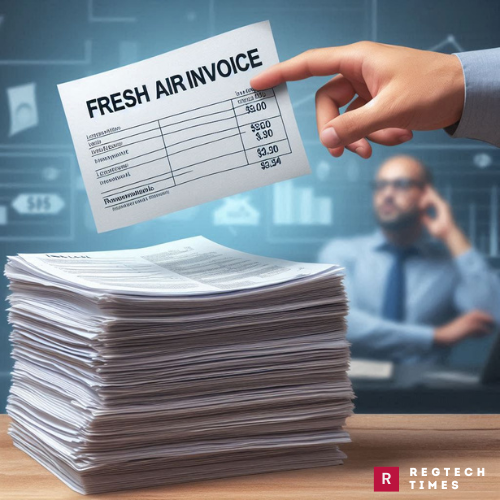A disturbing trend known as ‘fresh air invoicing’ has emerged in last few weeks, posing a significant threat to these principles.
This dishonest act involves financially distressed businesses issuing invoices for goods or services that were never actually dispatched or rendered. Instead of real transactions, these fake invoices are made up just to get quick money from finance companies or firms that give money for invoices.
What is Fresh Air Invoicing?
Fresh air invoicing, as the name suggests, involves invoicing for goods or services that exist only on paper—like invoicing for “fresh air” instead of products or services delivered. This deceptive practice typically occurs when a company faces financial difficulties and resorts to fabricating invoices to obtain funds quickly. These invoices falsely claim that goods have been dispatched or services rendered, when in reality, no such transactions have taken place. The aim is to fool finance providers into lending funds based on these fake invoices.
The Mechanics of Fresh Air Invoicing
Fresh Air Invoicing operates on a simple yet deceitful premise. When a business faces financial strain, often due to cash flow shortages or mounting debts, it may resort to issuing invoices for fake transactions. These invoices falsely claim that goods have been dispatched or services provided, when in reality, no such transactions have occurred. The offenders of this scheme then present these invoices to finance companies or invoice discounters, who advance a substantial portion of the invoice’s face value—typically between 70% and 90%—based on the belief that the transactions are genuine.
The Risks and Consequences
While fresh air invoicing may provide a temporary cash injection, the risks and consequences associated with this fraudulent practice are severe and far-reaching:
- Legal Ramifications: Engaging in fresh air invoicing amount to fraud, a criminal offense punishable by law. Businesses found guilty may face fines, legal proceedings, and potential imprisonment for individuals involved in arranging the scheme.
- Financial Fallout: Despite initial cash inflow, businesses remain liable for the full amount of the fake invoices. Finance companies may follow legal action to recover the advanced funds, exacerbating financial distress and potentially leading to insolvency.
- Reputational Damage: The discovery of fresh air invoicing damage a company’s reputation irreparably. Trust among stakeholders—customers, suppliers, and investors—is shattered, impacting future business relationships and opportunities.
- Regulatory Scrutiny: Authorities and regulatory bodies rigorously monitor financial transactions to detect fraudulent activities. Businesses engaging in fresh air invoicing risk scrutiny, audits, and heightened regulatory oversight.
Case Studies and Real-World Impact
Fresh air invoicing happens in many places and industries around the world. When businesses need money quickly and are struggling to pay their bills, they sometimes use this trick. They make fake bills to get cash fast. This shows that it’s important for businesses to have strong rules and always act honestly to avoid these problems.
Mitigation and Prevention Strategies
To safeguard against the allure of fresh air invoicing and uphold ethical standards in business finance, proactive measures are essential:
- Enhanced Due Diligence: Finance companies must conduct thorough due diligence on invoice authenticity, verifying the existence of transactions and goods/services delivered.
- Internal Controls: Implementing strict internal controls and audit mechanisms deters fraudulent activities, ensuring transparency and accountability in financial operations.
- Ethical Leadership: Foster a culture of integrity and ethical conduct from top management down, emphasizing compliance with legal and regulatory standards.
Fresh air invoicing is when businesses lie about sales to get money quickly. This is dishonest and can cause big problems. They might get in legal trouble, lose a lot of money, and damage their reputation. To avoid this, businesses should always be honest, manage their money well, and follow the rules. This helps them stay trusted and successful for a long time.


